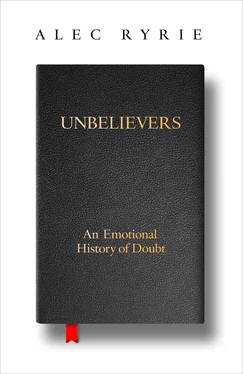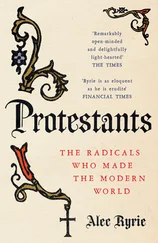Medieval Europeans did not have the word ‘atheism’, but they understood the idea well enough. When the founder of medieval theology, Anselm of Canterbury, wrote his famous ‘ontological’ proof that there is a God in the 1070s, it was a devotional exercise in using reason to praise God, not a serious attempt to persuade actual sceptics. Still, he imagined and tried to reply to the counter-arguments which a sceptic would make. The scholarly method he was pioneering required him to do it. Medieval theologians built up their schemes of knowledge by systematically examining all possible objections to them. The greatest of those theologians, Thomas Aquinas, whose proofs of God were less dreamlike than Anselm’s, did not merely conjure up an opponent as a debating foil. Imagining what an atheist’s arguments might be, he affirmed that it is perfectly possible to think that there is no God.[5] But there is little sign of these scarecrows coming to life and turning into real doubters.
Anselm called his imagined sceptic ‘the fool’. This was not a gratuitous insult. It was a deliberate allusion to a rather different stereotype of unbelief. Twice in the book of Psalms we read, ‘The fool says in his heart, “There is no God”’. This biblical ‘fool’ is not a simpleton, but a villain who refuses to believe so that he can do vile deeds, untroubled by fears of divine justice.[6] That is obviously a grossly unfair caricature. But to judge by the cases of people accused of unbelief before medieval church courts, it was at least partly correct.
In 1273 a merchant named Durandus de Rufficiaco de Olmeira was hauled before officials of the bishop of Rodez, in southern France. He confessed to telling a friend that profit was better than virtue. When the friend teased him, saying that he did not care for his soul, he replied, ‘Do you think there is any soul in the body other than the blood?’ As a young man, he said, he used to cross himself piously, but it never did him any good, nor had his fortune suffered when he stopped. He also admitted to having scorned the miracle of transubstantiation, in which the sacramental bread is transformed into Christ’s body. ‘Even if the body of Christ were large as a mountain, it would long ago have been eaten up by priests.’ Likewise, in 1299, Uguzzone dei Tattalisina, a notoriously tight-fisted moneylender from Bologna, was accused of dismissing the Bible as a mere fiction. He allegedly told Mass-goers that they might as well venerate their dinner as the consecrated bread; claimed that the True Cross, Christendom’s most venerated relic, was just a piece of a bench; and said that ‘there is no other world than this’. Another Mass-mocking moneylender from the same city was more explicit in denying that there was any afterlife or resurrection. When challenged on the point, he retorted, ‘When did you see the dead return to us?’[7]
The courts do not seem to have found these cases of unbelief especially surprising. These men were grasping, stone-hearted money-grubbers, so it made theological sense that they should have no faith. When Nicholas, the abbot of Pasignano, was accused before the Italian Inquisition in 1351 of various acts of fraud and extortion, including threats to castrate anyone who dared testify against him, it was positively a relief to discover that he also believed that it was better to be rich than to be in holy orders, or that he treated the liturgy with contempt.[8] It hardly mattered whether these people lived wicked lives because they had abandoned their faith, or had abandoned their faith in order to live wicked lives. Either way, angry and contemptuous unbelievers of this kind did not threaten the religious world around them. They reinforced it.
The same was true of an even angrier species of ‘unbelief’: blasphemy. In 1526 a servant boy in Toledo was hauled before the Spanish Inquisition after multiple witnesses reported him for saying ‘I deny God and Our Fucking Lady, the whore of the cuckolded arsehole’. Unusually inventive, but not unique. Blasphemy was by far the most common offence brought before the Inquisition: typically words uttered during a quarrel, in a tavern or at a gaming table. Crying out ‘I deny God and the bastard of his lineage’, as one Juan de la Calle did during a bad losing streak, might get you into trouble, but it was not a serious atheist’s manifesto. Thomas Aquinas argued that such blasphemies were sinful, but not heretical: mere insults to God, arising from a momentary, almost involuntary eruption of rage. And what more potent way to insult God than to deny him altogether? Like another common medieval oath – cursing your own parents – this was about shock and macho posturing. It was playing Russian roulette with your own soul, to show that, since you were plainly not afraid of God, you were not afraid of anything. Another Spaniard, Juan Gutierrez, was accused in 1516 of saying ‘God is nothing’. In the cold light of day before the tribunal, he admitted the charge, but maintained plaintively that he had of course not meant it. He had simply been ‘fired up by anger and passion and dismay’. He had, he said, lashed out at God much as he might have said to a neighbour in a quarrel, ‘Go on, you’re nothing!’ Most inquisitors were content to accept this kind of excuse. Even when blasphemy was too serious to go unpunished, the penalties – the pillory, cutting off the ears – were typically designed to humiliate. These people were not seriously arguing that there is no God. They were just showing off.[9]
Blasphemers insulted God but did not forget him. If they were angry with him, that was simply a recognition of his power. If you believe in an omnipotent God, everything is his fault. The irony, as pious commentators observed, was how constantly God’s name was on blasphemers’ lips. But this did not make their defiance trivial. Blasphemy had the effect of scent-marking places – alehouses, gambling dens, brothels, barracks, ships – where different rules applied, and where a degree of demonstrative impiety was expected or even rewarded. In the centuries to come, these irreligious spaces would serve as reservoirs of angry, scornful or contemptuous unbelief, from which it could seep out into the wider culture. It is no coincidence that these were all thoroughly male-dominated spaces. Blasphemy was, the lawyers agreed, a gender-specific crime. Women, it was said, blasphemed less than and differently from men. They typically complained to God of their suffering, challenged his justice or cursed their own births.[10]
Even if you did not mean it when you defied God, your words had consequences. If God did not strike you down for your wickedness, you might reach for the dread words more readily next time – or go further, since blasphemy depends on shock value and is therefore liable to runaway inflation. You might find yourself asking in your heart: is there really a God? Even to try out the feel of the words on your tongue was to peer over the edge of a cliff. Perhaps you were only trying to scare yourself, or others, and had no intention of actually leaping off. But you had looked, you had imagined, and felt a thrill that was more than fear. If the time ever came to jump – or if the cliff ever began to crumble beneath you – you would not be entirely unready.
Losing your temper with God might feel good, but it did not achieve very much. A more practical and dangerous target for anger was his self-appointed representatives on earth. The case of Isambardus de Sancto Antonio, in thirteenth-century southern France, ought never to have come to anything. All that had happened was that, when a preacher introduced his sermon by promising to ‘say a few words about God’, Isambardus said audibly, ‘the fewer the better’. If he had apologised to the court, nothing more would have happened. But he refused, and instead launched into a series of tart remarks about how priests invented ceremonies to extort money from the people. Likewise the Montauban peasant who claimed in 1276 that he would not confess his sins to a priest even if he had sex with every woman in the village. He was no more making a theological argument than he was eyeing up his neighbours; he was simply railing against one of the most widely resented pinch points of priestly control over lay people. Another Spaniard was accused before the Inquisition in the late fifteenth century for saying, ‘I swear to God that this hell and paradise is nothing more than a way of frightening us, like people saying to children “the bogeyman will get you”’. This is resentment at being manipulated, not speculation about the fate of the dead.[11]
Читать дальше












